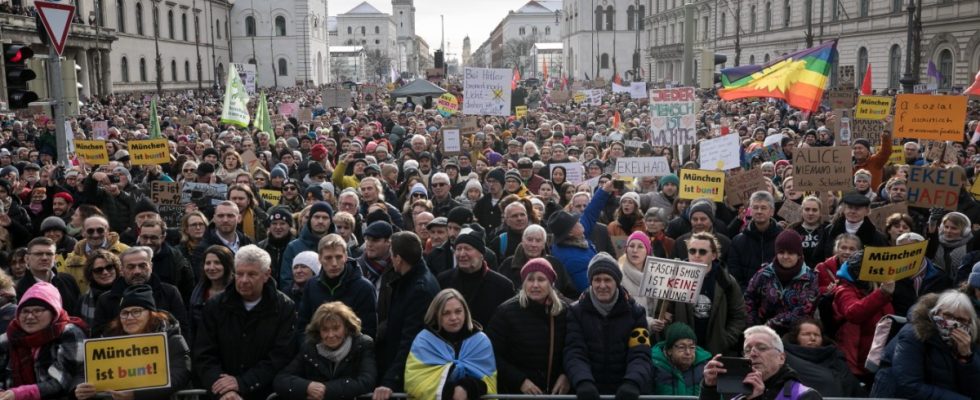At the founding party conference of the “Sarah Wagenknecht Alliance” (BSW) on January 27th in Berlin, the namesake and newly elected chairwoman diagnosed that something was currently “tipping” in Germany. In the opinion of the former left-wing politician, everything is now possible, both a new departure – by which Wagenknecht of course meant herself and her new party – and a catastrophe that would inevitably threaten the country if the traffic light coalition continued to exist and the AfD continued to grow in strength .
Political scientist Karl-Rudolf Korte looks to the future with significantly more confidence. His new book relies on sober analysis and scientific empiricism. And in doing so, it stands out in a pleasantly calm manner from the widespread swan songs of our democratic order, which, with reference to the Weimar situation, are currently being sung in bright colors in politics, the media and journalism.
The motif of the “weekly market” cited by Korte at the beginning is of course to be understood as a metaphor; as a place where not only trade takes place – because it is certainly not the market that regulates democracy, as Korte rightly emphasizes – but which primarily serves for encounters and exchanges. The parties in the political center have neglected this communication space in recent years. Which is why they no longer reached their voters in the way that was necessary for trusting “customer loyalty”. We would like to know more about what exactly can be done about it. But the book unfortunately remains vague with the point that the parties have to position themselves as “good hosts” on the “voter markets” again.
“Politics as a fire extinguisher”
Reading proves to be more fruitful when Korte takes an analytical look at the dynamics of the party landscape and the peculiarities of voting behavior. And this under conditions that have fundamentally changed, both in terms of media reporting on politics and the massively increased complexity of the political situation; especially since the national regulatory framework has long been interwoven with a global reality that cannot be controlled from Berlin. As a result, according to Korte, political decisions have to be readjusted more and more frequently, which creates the public impression of political weakness or even powerlessness. The positive creative powers of politics have faded into the background, and in their place is increasingly being replaced by “politics as a fire extinguisher in experimental mode”, in which the actors involved act more as drivers of change than as drivers of change.
This new confusion and apparent impenetrability of problems – Korte speaks of an “age of loss of certainty” – is feeding people’s longing for clear answers. The individual approach to politics has also changed; today it is less tied to parties and more driven by values and outrage, a “collage society,” according to Korte, “characterized by the balancing act between individualization and security.”
Nevertheless, Korte sees no immediate cause for distress or even doomsday scenarios, although he also urges caution. The democratic base in Germany is more stable than in most other European countries; Structurally, a “moderate political centrality” focused on security and stability dominates. The often diagnosed political polarization has so far been reflected more in the surveys than in election results.
About the AfD’s “seepage poison”.
Nevertheless, Korte admits that this is a finding, not a prognosis, and that the current “authoritarian temptation” should not be underestimated; especially since the traffic light government took office at the end of 2021, the debate space in Germany has also noticeably shifted to the right, which – which is also part of the overall picture – corresponds to a catch-up adjustment to most European societies. Korte sees the greatest danger in the fact that the AfD’s “seepage poison” will continue to spread, although he expects that the right-wing populists have already exhausted their potential to the maximum and that the popularity they are currently receiving is likely to wane again.
Karl-Rudolf Korte: Voter markets. Voting behavior and government policy in the Berlin Republic. Campus-Verlag, Frankfurt 2024. 231 pages, 26 euros.
(Photo: Campus)
However, the prerequisite for this is that the democratic parties in the center assume their responsibility and, within the framework of what is politically possible, fulfill the Germans’ heartfelt desire for stability and security. However, the traffic light’s climate and energy policy has had the opposite effect, and the state has so far failed to demonstrate its political ability to act in migration and asylum policy. The weakening of the wage gap requirement can be supplemented by the traffic light with the almost 25 percent increase in citizen’s allowance within two years, which is unlikely to be easily communicated, especially to those on low incomes who can only dream of such wage increases.
Accordingly, Korte sees a “responsibility pressure” on the center parties to secure the common good, even if this sometimes leads to “policy paradoxes”. Specifically, he mentions the need for the CDU and CSU to become climate protection parties, while the parties of the moderate left spectrum should take off their ideological blinders when it comes to asylum and migration policy – which is now increasingly happening; Korte completed his book in October 2023.
Korte trusts the strength of democratic institutions and structures and relies on the rationality of the majority of citizens, without downplaying the existing threats posed by right-wing populists. The recent large-scale demonstrations against right-wing radicalism across Germany seem to confirm this, provided the government does not use them as an opportunity to put urgent political action aside.
Florian Keisinger is a historian.

